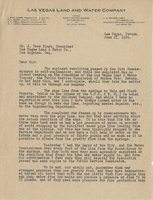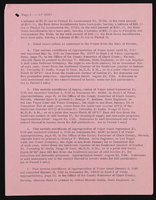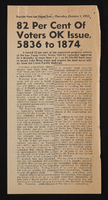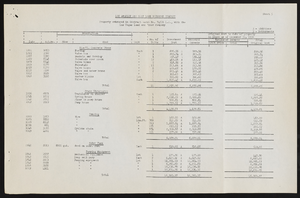Search the Special Collections and Archives Portal
Search Results
Robert B. Griffith Photograph Collection
Identifier
Abstract
The Robert B. Griffith Photograph Collection (approximately 1950-1970) contains black-and-white and color photographic prints, negatives, and slides of Las Vegas, Nevada including Fremont Street, Helldorado parades, and hotel and casino properties along the Strip including the Sahara Hotel and Casino, the Flamingo Las Vegas, the El Rancho, the Thunderbird Hotel and Casino, and the Hotel Last Frontier. Also included are photographs of Lake Mead Recreation Area and tunnel drilling within and near the Las Vegas Valley, Nevada. Other Nevada locations outside of Las Vegas include Reno, Virginia City, and Crystal Bay, Nevada.
Archival Collection
George Laurence Ullom Photograph Collection
Identifier
Abstract
The George Laurence Ullom Photograph Collection (1915-1974) contains photographic prints and negatives created by Las Vegas, Nevada photographer George Laurence "Larry" Ullom. Larry owned and operated Ullom’s Desert Art Studio, which was located in Las Vegas, Nevada. The bulk of the collection consists of Ullom's wedding chapel photography. The collection also includes his photography work for the Bureau of Reclamation, the Agricultural Extension Service, and the Associated Press, Atlantic News, and Acme news bureaus.
Archival Collection
Mollie Gregory Collection of Oral Histories
Identifier
Abstract
The Mollie Gregory Collection of Oral Histories contains audio interviews and brief transcripts that focus on welfare, family, and women's issues in Nevada from 1970 to 1974. Gregory interviewed Nevada residents including Maya Miller, Ruby Duncan, and Mary Wesley, who described their lives during the anti-poverty and women's rights campaigns in the early 1970s. The collection documents views on welfare; the Equal Rights Amendment; race, discrimination, and civil rights; and political campaigns.
Archival Collection
International Food Service Executives Association Records
Identifier
Abstract
The International Food Service Executive Association (IFSEA) Records contain the organizational records from the IFSEA dating from 1916 to 2010. Included are meeting programs and minutes, menus, conference reports and proceedings, financial reports, newsletters, award certificates, scrapbooks, and stewards and caterers records focusing on the hospitality and food service industry. Materials are from both national and regional branches of the organization and include records from the United States military, with whom IFSEA has partnered with since the 1960s. Club artifacts and trophies are also contained in the collection.
Archival Collection

Letter from Walter R. Bracken (Las Vegas) to J. Ross Clark (Los Angeles), June 21, 1921
Date
Archival Collection
Description
Bracken appraising Clark of a complaint by the City Commission to the Nevada Public Service Commission and its resolution.
Text




